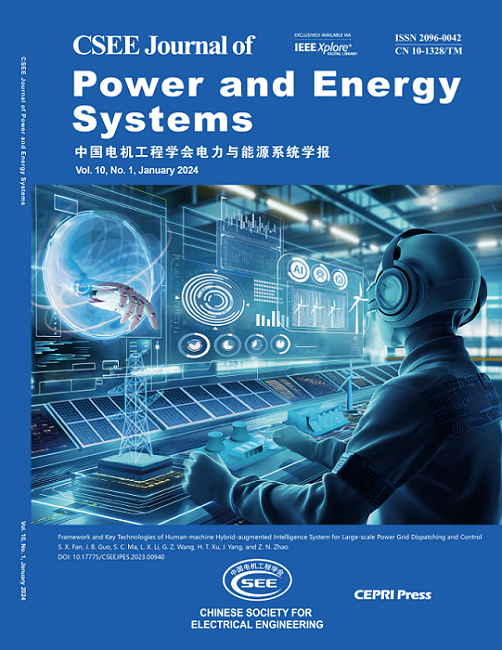采用不同直流链路电压控制器的 VSG 瞬态稳定性分析与设计
IF 6.9
2区 工程技术
Q2 ENERGY & FUELS
引用次数: 0
摘要
虚拟同步控制具有模拟电压源变换器(VSC)惯性的优点,因此已被广泛研究。现有文献在估算虚拟同步发电机(VSG)的瞬态稳定性时,通常假定直流侧电压恒定。然而,虚拟同步发电机直流侧的实际供电是有限的,因此需要不同的直流侧电压控制器来实现直流侧和交流侧之间的功率平衡。增加直流侧电压控制器对 VSG 的瞬态行为有很大影响,而之前的研究尚未对此进行研究。为了填补这一空白,本文深入探讨了直流侧电压动态对 VSG 瞬态稳定性的影响。首先,介绍了两种典型的带直流侧电压控制器的 VSG。然后,建立了考虑直流链路动态的数学模型,并通过等面积准则(EAC)揭示了直流链路电压控制器对 VSG 瞬态同步稳定性的影响。研究发现,直流链路电压控制器会降低 VSG 的稳定裕度,并利用临界清除时间 (CCT) 进行了以设计为导向的瞬态稳定性定量分析。最后,给出了仿真结果,以验证理论分析的正确性。本文章由计算机程序翻译,如有差异,请以英文原文为准。
Transient Stability Analysis and Design of VSGs with Different DC-Link Voltage Controllers
Virtual synchronous control has been widely studied for the advantages of emulating inertia for voltage source converters (VSCs). A constant dc-link voltage is usually assumed in existing literature to estimate transient stability of virtual synchronous generators (VSGs). However, actual power supply in the dc-side of VSGs is limited and different dc-link voltage controllers are needed to achieve power balance between DC side and AC side. Addition of dc-link voltage controller has great influence on transient behavior of VSGs, which has not been investigated by previous research. To fill this gap, this paper gives insights into the effect of dc-link voltage dynamics on transient stability of VSGs. First, two typical kinds of VSGs with dc-link voltage controllers are introduced. Then, mathematical models considering dc-link dynamics are established and the effect of dc-link voltage controllers on transient synchronization stability of VSGs is revealed through equal area criterion (EAC). It is found that dc-link voltage controller would reduce stability margin of VSGs and design-oriented transient stability analysis is carried out quantitively using critical clearing time (CCT). Finally, simulation results are given to validate correctness of theoretical analysis.
求助全文
通过发布文献求助,成功后即可免费获取论文全文。
去求助
来源期刊

CSEE Journal of Power and Energy Systems
Energy-Energy (all)
CiteScore
11.80
自引率
12.70%
发文量
389
审稿时长
26 weeks
期刊介绍:
The CSEE Journal of Power and Energy Systems (JPES) is an international bimonthly journal published by the Chinese Society for Electrical Engineering (CSEE) in collaboration with CEPRI (China Electric Power Research Institute) and IEEE (The Institute of Electrical and Electronics Engineers) Inc. Indexed by SCI, Scopus, INSPEC, CSAD (Chinese Science Abstracts Database), DOAJ, and ProQuest, it serves as a platform for reporting cutting-edge theories, methods, technologies, and applications shaping the development of power systems in energy transition. The journal offers authors an international platform to enhance the reach and impact of their contributions.
 求助内容:
求助内容: 应助结果提醒方式:
应助结果提醒方式:


